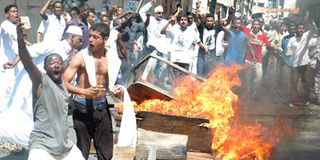Use of spy agency reports could have averted chaos

Members of the public demonstrate in Mombasa town during the post-election violence in January. Photo/FILE
The deadliest of the election-related violence could have been avoided had the Government made use of its own intelligence reports, the Waki commissioners say.
Intelligence agents knew and warned of imminent violence regardless of who won the December 27 poll.
The military was well-prepared to handle any violence, but the police were not, said the commission’s report.
According to the report, “the police approach to its task before, during and after the elections reflected a misplaced arrogance that they would always be able to control what came up.”
Intelligence reports warned as early as September last year of violence in specified areas. And Kenya’s spy agency, the National Security Intelligence Service (NSIS), even named individuals behind hate campaigns and regions that were affected.
Preventive action
So glaring was evidence of possible violence that the Waki report notes: “Given the extensiveness of the intelligence developed and distributed by the service, it was disturbing to note that in the end there was an almost fatalistic realisation that no sufficient preventive action would be taken to ameliorate the mayhem.”
It continues: “Whilst it is clear that the Commissioner of Police (Hussein Ali) was privy to this information, it is less clear how full and detailed intelligence reports were or should have been provided to the provincial and district committees.”
The commission established that faxes were sent from Mr Ali’s office to provincial police officers from time to time in the run-up to and after the General Election.
Many Provincial Administration and regular police officers, however, had not received special guidelines and directions on the post-election scenarios drawn up by the NSIS in spite of the information being available.
A review of available data showed that security officials had knowledge and understanding of the security situation that was developing in their areas of responsibility, the report said.
In Trans Nzoia East and West, one of the security committee meetings noted a worrying security situation in the two districts where Kikuyus were being targeted.
It observed: “Whichever way the results go, Kalenjins are planning to attack Kikuyus and invade their farms.”
Support patrols
In Molo, the local security intelligence team determined in its meeting of November 22, 2007, that due to irregularities in the party nomination process and “blatant rigging” the political atmosphere became charged, leading to defections and acrimony.
It advised that there was a strong need to strengthen security operations preceding the elections.
It recommended that five police posts be established and additional funding be allocated to support patrols and rapid deployment operations. There is no record of these initiatives having been followed through.
While there is evidence of good information gathering, intelligence preparation and understanding of security issues, there is a weakness in translating this into clear, demonstrable and useful operational interventions.
The report said the NSIS was best prepared for the violence that befell Kenya.
It gathered data about the chaos that could occur around the time of the General Election.
It also produced a range of reports highlighting the issues and provided them to senior Government officials, as well as police, military, prisons and other agencies.
The NSIS produced both regular and special reports regularly throughout the months leading up to the General Election.
They include hotspots and flashpoint updates, situation reports and security briefs at provincial and district levels.
NSIS went as far as recommending that operational agencies should come up with specific contingency plans, take action against inciters and financiers of criminal gangs and ensure staff refrained from partisan behaviour.
The spy agency accurately forecast what was likely to happen should either ODM’s Raila Odinga or PNU’s Mwai Kibaki win the presidential election.
A special report entitled “Critical Dates and Events - General Elections 2007” was forwarded on December 6 to the chairman of the Electoral Commission of Kenya, Mr Samuel Kivuitu.
Trained troops
Among other things, it warned that “increased political activity and attendant lawlessness are likely to overwhelm the security organs”.
The Waki report praised the military, saying it was the most prepared institution regarding the violence.
“The military prepared contingency plans, anticipatory orders, trained troops and rehearsed in order to respond appropriately to likely scenarios, conducted barazas (meetings) with staff around their need to remain apolitical in accordance with military values to ensure that should the need arise military support could be provided quickly and effectively,” the said report.
“In terms of preparedness for dealing with the violence, the police were simply too far off the mark,” it said.




